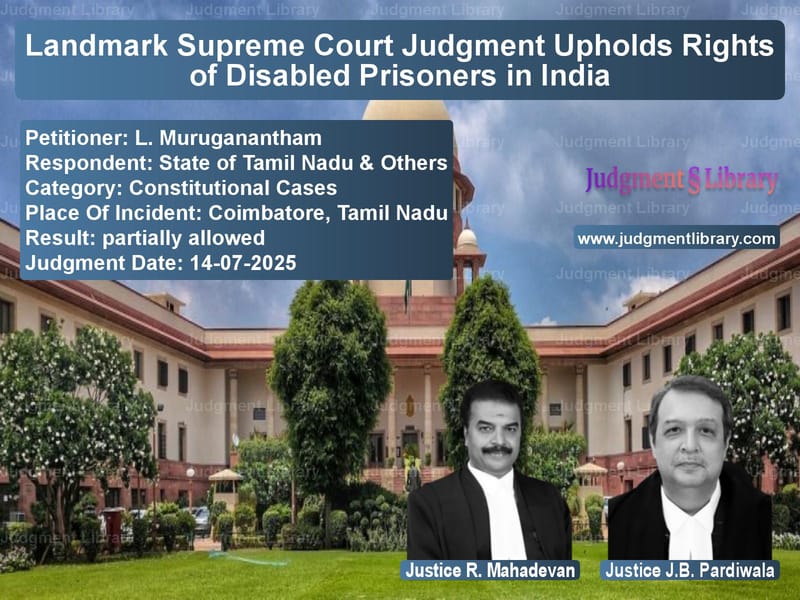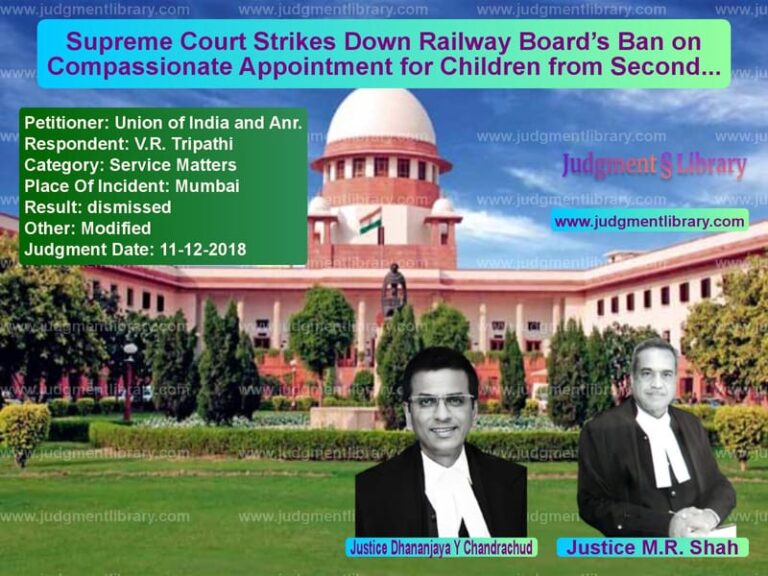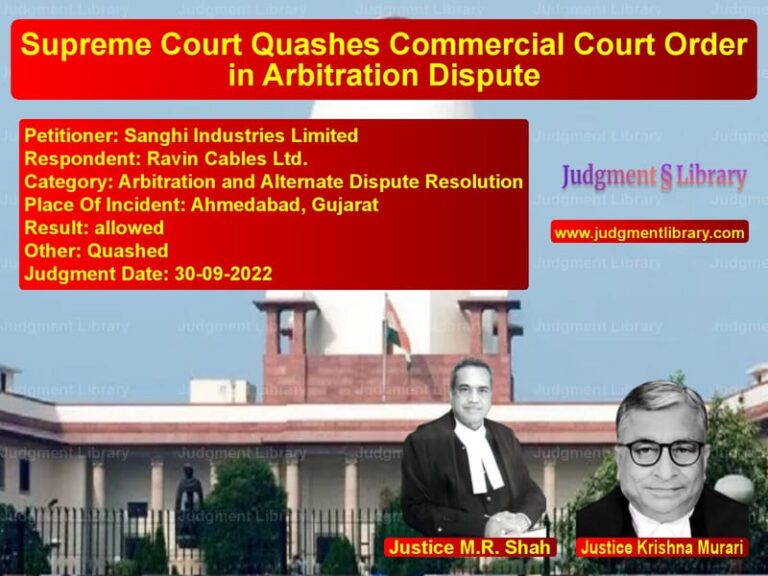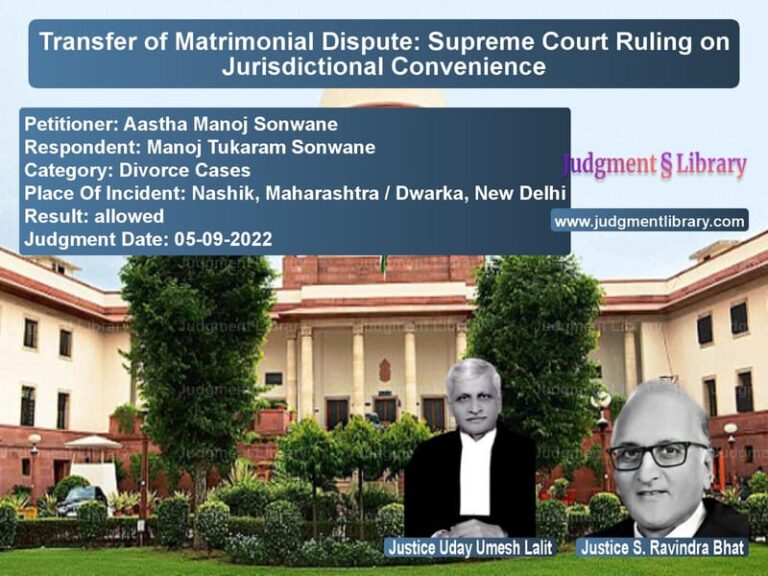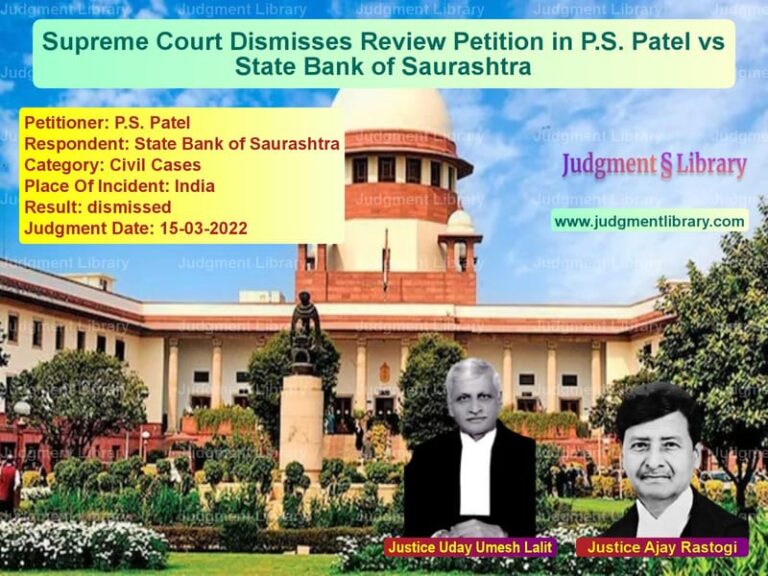Landmark Supreme Court Judgment Upholds Rights of Disabled Prisoners in India
In a powerful judgment that reaffirms the constitutional rights of some of the most vulnerable members of our society, the Supreme Court of India has delivered a landmark verdict addressing the plight of prisoners with disabilities. The case of L. Muruganantham, a physically challenged advocate suffering from Becker Muscular Dystrophy, has brought to light the systemic failures in our prison system and established crucial protections for incarcerated individuals with disabilities.
The story begins with what the courts would later determine was a false criminal case against Muruganantham and his aged mother. According to the appellant, this complaint was lodged at the behest of his paternal uncle through one Selvakumar, with the ulterior motive of coercing him into transferring valuable properties. The case was registered as FIR in Crime No. 108 of 2020 for offences under Sections 294(b), 323 and 506(ii) of the Indian Penal Code.
Based on this FIR, Muruganantham was arrested on February 29, 2020 by Respondent No. 2, who allegedly harassed and tortured him. He was then produced before the Judicial Magistrate, Udumalaipet, who remanded him to judicial custody. What followed was a period of incarceration that would expose the grave inadequacies in our prison system when it comes to accommodating persons with disabilities.
The Appellant’s Condition and Prison Experience
Muruganantham is not just any prisoner. He is a physically challenged person suffering from Becker Muscular Dystrophy, a progressively degenerative locomotive disability. His condition had worsened over time, with his disability assessed at 70% in 2013, which increased to 80% in 2020. He also suffers from autism and mental illness, making him part of what the Supreme Court would later describe as “the most marginalized and vulnerable groups within the justice system.”
During his incarceration at the Central Prison, Coimbatore, from February 29 to March 10, 2020, Muruganantham alleged that Respondent No. 3 failed to provide proper food, medical treatment, and care as required under the Rights of Persons with Disabilities Act, 2016. The prison lacked infrastructure and facilities necessary for prisoners with disabilities, and the officials were allegedly insensitive and ill-informed regarding the rights of persons with disabilities.
The appellant made detailed submissions about his prison experience: “That the appellant suffers from Becker Muscular Dystrophy, Autism Spectrum Disorder, and associated psychological conditions. During incarceration, he was denied essential support such as physiotherapy, psychotherapy, protein-rich nutrition (e.g., eggs, chicken, nuts), accessible sanitation facilities, ramps, a low sensory environment for rest, and warm water for bathing. This lack of accommodation caused further deterioration of his physical and mental health, as evidenced by undisputed medical records showing his disability progressed from 70% in 2013 to 80% in 2020.”
He further stated: “That the appellant repeatedly informed prison and medical authorities of his health condition, yet no physiotherapy or psychotherapy was provided. Protein-rich foods were denied, and milk was supplied on only 7 out of 10 days. The prison lacked accessible toilets and ramps, including in the dispensary. Loud announcements and continuous lighting aggravated his sensory distress. The hostile environment worsened his Avoidant / Restrictive Food Intake Disorder (ARFID), a condition recognized under DSM-5, leading to further mental and physical deterioration.”
The Legal Journey
Subsequently, Muruganantham filed a complaint before the State Human Rights Commission (SHRC), seeking compensation of Rs. 50,00,000/- for the deprivation of life and liberty during incarceration. He also sought directions for the payment of Rs. 2 crores to the Disability Rights Public Fund under the RPwD Act, 2016 for violations of his human, fundamental, and statutory rights, and for action against the erring officials.
After hearing all parties, the SHRC disposed of the complaint with recommendations that the Government of Tamil Nadu pay compensation of Rs. 1,00,000/- to the complainant, recoverable from the first respondent (the police officer). The Commission also recommended initiating disciplinary action against the police officer and further recommended that the Government of Tamil Nadu make all prisons in the State accessible for persons with disabilities as per the RPwD Act, 2016.
Aggrieved by this order, both parties approached the High Court. Muruganantham filed a writ petition seeking enhanced compensation and action against prison authorities, while the police officer filed a separate petition seeking to quash the SHRC’s order. The High Court partly allowed Muruganantham’s petition, enhancing the compensation to Rs. 5,00,000/- while dismissing the police officer’s petition. Still unsatisfied, Muruganantham approached the Supreme Court.
The Supreme Court Hearing
During the Supreme Court hearing, Muruganantham, appearing as a party-in-person, made several compelling arguments. He emphasized the deterioration of his health due to prison conditions: “That as a result of the violations suffered, the appellant now experiences sleep deprivation, chronic pain, ulceration, and severe psychological trauma requiring long-term medication with significant side effects. His deteriorated health has also diminished his eligibility for advanced gene therapy – costing over Rs. 16 crores – which should be considered while assessing compensation.”
He also highlighted systemic issues: “That Prisons are ill-equipped to provide reasonable accommodations to persons with disabilities. Despite statutory mandates under Sections 39 and 47(1)(a) of the RPwD Act, 2016, no sensitization or awareness programmes have been conducted for prison staff. RTI responses reveal that prison authorities maintain no data on accessibility, accommodations, or compliance.”
The respondents, however, presented a different picture. They argued: “That the appellant was continuously housed as an inpatient in the Prison Hospital from 29.02.2020 to 10.03.2020. This, according to the respondents, indicates that the prison authorities took necessary steps to address the appellant’s specific needs, including providing a cot with a mattress, a special medical diet (milk and egg), psychiatric counselling, and assistance from medical staff and co-prisoners for daily routines.”
They further submitted: “That Central and Special Prisons in Tamil Nadu are equipped with wheelchairs, disabled-friendly toilets, and trained personnel to attend to the needs of elderly, sick, and disabled inmates. All such facilities were available to the appellant. The Medical Officer recorded all relevant details in the prescribed proforma as per the guidelines issued by the National Human Rights Commission.”
The Supreme Court’s Analysis
The Supreme Court, in its judgment delivered by Justice R. Mahadevan with Justice J.B. Pardiwala, addressed two broad issues: whether the High Court’s enhancement of compensation called for interference, and whether adequate facilities are being made available to prisoners with disabilities in Tamil Nadu prisons.
On the first issue, the Court noted: “Both the SHRC and the High Court unequivocally held that the FIR, arrest, and incarceration of the appellant were carried out at the behest of his paternal uncle with the ulterior motive of usurping his property. The arrest was illegal and did not comply with the safeguards prescribed by this Court. Importantly, the authorities failed to consider the appellant’s disability status. These findings are supported by documentary evidence, and we find no reason to depart from them.”
Regarding compensation, the Court observed: “While it is evident that the appellant did not receive certain medical and dietary facilities appropriate to his condition during incarceration, the records indicate that he remained in the prison hospital throughout and was provided with some special amenities recognising his disability. The absence of specific provisions, such as protein-rich food or specialised medical interventions appears to stem from institutional limitations within the prison system rather than from any deliberate neglect or malice on the part of the prison authorities.”
The Court made an important distinction about prison conditions: “Prisons are correctional institutions – not extensions of civil society’s comforts. The non-supply of non-essential or indulgent items does not amount to a constitutional or human rights violation unless it results in demonstrable harm to health or dignity. Considering the nature of the appellant’s disability (assessed at 80%), the progressive deterioration of his health during custody, and the ongoing treatment, he requires, the High Court was justified in enhancing the compensation from Rs. 1,00,000/- to Rs. 5,00,000/-. We find this amount to be fair, just, and reasonable in the facts and circumstances of the case.”
Broader Systemic Issues
While the Court found the compensation adequate for the individual case, it used the opportunity to address the larger systemic issues affecting prisoners with disabilities across the country. The judgment contains powerful observations about the state of Indian prisons.
The Court expressed deep concern: “This Court expresses deep concern over the plight of incarcerated individuals with disabilities, who are among the most marginalized and vulnerable groups, within the justice system. The social and structural barriers they face in society are only magnified within the prison environment. Unlike the minimal safeguards afforded to women prisoners, there is currently no specific legal or policy framework that guarantees dignity, accessibility, and protection for persons with disabilities or for members of the transgender community in prisons.”
The Court described the practical challenges faced by disabled prisoners: “Most prison facilities are structurally inaccessible to individuals with mobility, sensory, or cognitive impairments. Institutional routines and infrastructure are not designed to accommodate diverse needs, making it difficult – or at times impossible – for such prisoners to use toilets, dining areas, libraries, or health clinics. Additionally, due to the absence of trained caregivers or appropriate custodial policies, persons with disabilities are often denied help with essential daily activities such as bathing, dressing, or eating. This neglect results in indignity, mental distress, and, at times, serious physical harm.”
The judgment emphasized the legal obligations: “Such inaccessibility and denial of basic care are not mere administrative lapses; they amount to violations of fundamental rights enshrined under Articles 14 and 21 of the Constitution of India. They also breach provisions of the RPwD Act, 2016 – specifically Sections 6, 25, and 38 – which mandate the State to ensure healthcare and non-discriminatory treatment for persons with disabilities, including those in custody. Furthermore, under Article 15 of the UNCRPD, to which India is a signatory, any cruel, inhuman, or degrading treatment of disabled persons in detention is strictly prohibited.”
The Court also highlighted the critical data gap: “Despite clear constitutional and statutory mandates, the lack of disaggregated data on disability continues to hinder targeted policy intervention. In response to a Parliamentary query in 2016, the Government acknowledged that it does not maintain any data regarding disabled prisoners. The National Crime Records Bureau (NCRB) – despite providing detailed information on caste, gender, and religion – fails to record disability status.”
Landmark Directives for Prison Reform
The Supreme Court didn’t stop at observations alone. It issued comprehensive directives for immediate and time-bound compliance, rooted in Articles 14 and 21 of the Constitution, the RPwD Act, 2016, and India’s international obligations under the UNCRPD.
Some of the key directives include: identification of prisoners with disabilities at the time of admission; provision of prison rules and information in accessible formats; wheelchair-friendly spaces, accessible toilets, ramps, and sensory-safe environments in all prisons; dedicated spaces for physiotherapy and psychotherapy; a State-level access audit of all prisons in Tamil Nadu within six months; healthcare equivalent to that available in the community; trained and sensitized prison medical officers; nutritious and medically appropriate diets tailored to specific needs; comprehensive training for all prison staff on disability rights; review and amendment of the State Prison Manual within six months to ensure conformity with the RPwD Act; maintenance of disaggregated data on disability status of prisoners; and a monitoring committee to conduct periodic inspections.
The Court emphasized: “The State has a constitutional and moral obligation to uphold the rights of prisoners with disabilities. This includes not only ensuring non-discriminatory treatment but also enabling their effective rehabilitation and reintegration into society. This Court emphasizes that reasonable accommodations are not optional, but integral to any humane and just carceral system. A systemic transformation is urgently required – one grounded in compassion, accountability, and a firm constitutional commitment to dignity and equality. The disabilities of incarcerated individuals must not become a basis for further deprivation or suffering; rather, the prison system must evolve to affirm their rights and provide the care necessary for rehabilitation.”
A Transformative Judgment
This judgment represents a significant step forward in the recognition of disability rights within the Indian criminal justice system. While dealing with an individual case of a disabled prisoner who suffered due to inadequate facilities, the Supreme Court has used the opportunity to address systemic issues that affect countless similarly situated individuals across the country.
The Court’s directives, if implemented properly, have the potential to transform prison conditions for persons with disabilities. They establish clear standards for accessibility, healthcare, and reasonable accommodation that align with India’s constitutional values and international commitments.
Perhaps most importantly, the judgment reaffirms a fundamental constitutional principle: “Lawful incarceration does not suspend the right to human dignity. The punishment lies only in the restriction of liberty – not in the denial of humane treatment or reasonable accommodations. Failure to meet these obligations inflicts disproportionate suffering on disabled prisoners and betrays the constitutional role of the State as a custodian – not a tormentor – of those it detains.”
As India continues to work towards a more inclusive society, this judgment serves as a powerful reminder that our commitment to equality and dignity must extend to all citizens, including those who are incarcerated. The true test will now be in the implementation of these directives, which could potentially set a precedent for prison reforms not just in Tamil Nadu, but across the entire country.
Petitioner Name: L. Muruganantham.Respondent Name: State of Tamil Nadu & Others.Judgment By: Justice R. Mahadevan, Justice J.B. Pardiwala.Place Of Incident: Coimbatore, Tamil Nadu.Judgment Date: 14-07-2025.Result: partially allowed.
Don’t miss out on the full details! Download the complete judgment in PDF format below and gain valuable insights instantly!
Download Judgment: l.-muruganantham-vs-state-of-tamil-nadu-supreme-court-of-india-judgment-dated-14-07-2025.pdf
Directly Download Judgment: Directly download this Judgment
See all petitions in Fundamental Rights
See all petitions in Public Interest Litigation
See all petitions in Custodial Deaths and Police Misconduct
See all petitions in Education Related Cases
See all petitions in Reservation Cases
See all petitions in Judgment by R. Mahadevan
See all petitions in Judgment by J.B. Pardiwala
See all petitions in partially allowed
See all petitions in supreme court of India judgments July 2025
See all petitions in 2025 judgments
See all posts in Constitutional Cases Category
See all allowed petitions in Constitutional Cases Category
See all Dismissed petitions in Constitutional Cases Category
See all partially allowed petitions in Constitutional Cases Category

